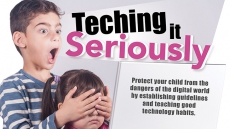It is time that we play our part in making our environment green, healthy & preserved for our future generations.
The three R’s – Reduce, Reuse and Recycle are taught to us in elementary school, in hopes of building a foundation of proper practices to keep our environment clean. However, do we really do everything we can to put these teachings and resources to full use? Often, the answer is no. I believe that two big reasons exist for this answer – one is that recycling still is not a habit for most people, but rather an additional chore that is sometimes remembered; and two, there are still a lot of gaps in knowledge and confusion built around what and how things can get recycled. These two areas can be worked on and fixed, which would create an amazing positive difference in the way we take care of our environment.
Recycle BC, a nonprofit organization launched in 2014, is dedicated to collecting and recycling products for 98 per cent of BC. By partnering with businesses, organizations and local governments, they provide information and resources on how to properly sort and recycle items. With their efforts, nearly 186,000 tonnes of recyclable material is collected each year. However, they still believe that citizens in BC can do better to ensure that the materials they set aside for collection and recycling are sorted properly and meet guidelines. This can be tough at times, as it is difficult to remember which cartons can be recycled, and which ones cannot. This is one of the reasons why we need to stop and think about what we are setting aside for recycling, and so often we choose to save time and just throw the item in the garbage instead. However, if we were more familiar with the regulations around recyclable items, it would become second nature, and so making the right call on what to recycle would become habit. There are many ways that we can teach ourselves so that we can become more informed, environment-friendly citizens.

There are many resources available for British Columbians to become accustomed to recycling guidelines, including several online platforms that make this task much simpler. According to a spokesperson from Recycle BC, the organization “regularly updates the main website, and has an entire section on the exact items that can and cannot be recycled. This makes it easy for anyone to quickly look up and decide what to do with any of their waste.”
Furthermore, using metrovancouverrecycles.org, any business owner or resident can look up items they want to recycle, and see which locations can accept them. The City of Surrey and City of Vancouver also work hard to promote proper recycling practices by having their own links and information on what to recycle. A spokesperson from the City of Surrey mentions that “it is important to consider that not only are we asking you to recycle items, but proper organic waste disposal is also necessary to keeping our environment healthy and clean. There are so many great uses that come from disposing organics properly, and all that unnecessary food waste is kept out of our growing landfill.”

The City of Surrey website has many great suggestions on how to sort and collect the organic waste without being worried about pests or odour, such as by using newspapers or Kraft paper bags to line the small organics buckets the City provides. Large items and electronics can also be recycled, and many cities across BC have a program which provides free pick-up of these items from your doorstep.
A very popular program known by most also exists, which is the Return-It program where residents can get cash back for recycling certain items like pop cans and glass bottles. The list of resources and support systems is endless when it comes to recycling, so now the biggest challenge is to motivate ourselves and take advantage of these resources to help save our environment.
As our province, and the world becomes more populated and polluted with fossil fuels, the environment is continually threatened by the harm we cause. Therefore, it is high time that we play our part in making our environment green, healthy and preserved for our future generations. Recycling is one of the easiest and most effective ways to do that, so it’s time that we step up and take responsibility, for our actions will determine the sustainability and future of planet Earth.

Recycling tips
There are a number of things we can all do to ensure as much material as possible is recycled. When recycling, keep the following tips in mind!
Not everything should go in your home recycling bin
You can recycle packaging and paper, including containers (plastic packaging, metal containers, and cartons and paper cups), paper (newsprint, magazines, paper packaging and cardboard), and glass bottles and jars (separated in curbside or multi-family recycling in some communities and at the depot in others). Things like food, wood, clothing, textiles, electronics, books, metal products (like pots, pans, hangers, etc.), and toys shouldn’t be included in your recycling bin.
Plastic bags don’t go in your home recycling bin
Plastic bags have to be returned separately to a depot for recycling. When they are included in your recycling bin, mixed with other recyclables, it makes it very difficult to meet the standards of both local and international recycling markets, potentially affecting the recyclability of all the material.
Only put rinsed items in your recycling
Half-full food containers should not go in your recycling bin. Empty containers and give them a quick rinse to ensure food or other product doesn’t get all over the other materials in your recycling bin.
- Inputs by Recycle BC



